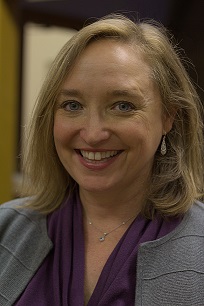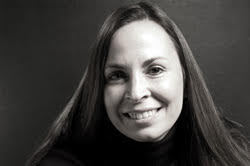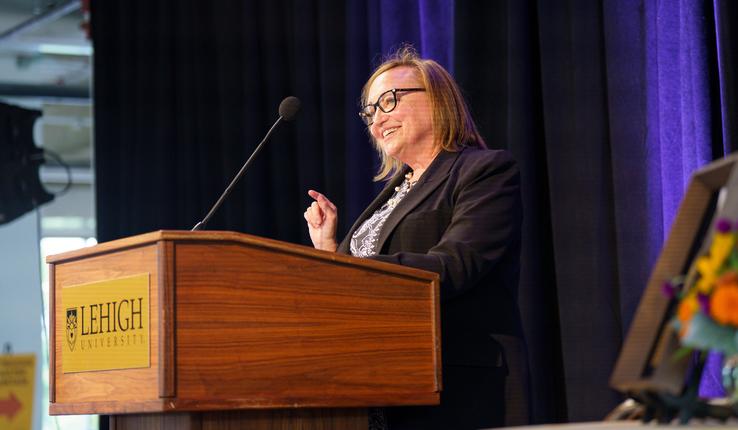'The Song Cycles of Beachy Head' to Have New York City Debut
When Beth Dolan and Amanda Jacobs met at Chawton House in Hampshire, England in 2014, an unusual creative partnership was born. The result of that partnership, “The Song Cycles of Beachy Head”— five art song cycles for piano and mezzo soprano based on Charlotte Smith’s 731-line blank-verse poem—will have its New York City debut at Carnegie Hall’s Weill Recital Hall on Nov. 4.
Dolan, associate professor of English, and Jacobs, a composer and playwright, were at the library on the grounds of the estate of Jane Austen’s brother for different reasons: Dolan was a Chawton House Library Fellow studying the children’s literature of English Romantic poet and novelist Charlotte Smith, and Jacobs was there as the Jane Austen Society of North America’s first composer-in-residence in their International Visitor Program. A dinnertime conversation led Jacobs to ask Dolan if she could suggest any poems for Jacobs to set to music.
Dolan sent Jacobs some of Charlotte Smith’s sonnets as well as a much more challenging option: Smith’s Beachy Head.
“I chose [Beachy Head] because it was the hardest to understand,” says Dolan. “There are other poems that are a lot more accessible, and this one is just massive.”
Over the course of about a year, the two read through and discussed the poem via Skype. Dolan developed the lyrics and Jacobs composed the music. They’ve since performed the piece, which they present in lecture recital format, in England and Australia, at Lehigh’s Zoellner Arts Center and in several states across the U.S. The Weill Recital Hall at Carnegie Hall will be their largest performance venue to date.
“It’s wonderful to know that the work is of the highest quality to be accepted by Carnegie Hall,” says Jacobs. “The point of doing this concert is to bring women’s genius [of 200 years ago] to light…and to put it up in a place that is recognized as having the highest pinnacle of recognition and success in the arts.”
Beachy Head: A Bold Creative Challenge
Dolan says the two had no sense of the scale of the piece when they began working on it.
“It was a big poem and I didn’t know if [Jacobs] would want to set it at all or if we would just set a part of it,” she explains. “What Amanda’s accomplished is really unusual. There are other song cycles—[German composer Robert] Schumann, for example—but they tend to be collection of poems that are set to music, not based on one massive poem… It’s amazing.”
Jacobs agrees.
“The magnitude of this poem was very daunting,” she says. “I know of no art song cycle that is derived from a single poem. An art song cycle is usually from a series of poetry or a collection of poetry, but nothing of this magnitude, ever.”
Dolan edited the poem to draft the lyrics and Jacobs began the composition process, which involved reading the poem over and over again. As the pair dissected Beachy Head, they began to recognize where Charlotte Smith had repeated imagery. They determined which words could be removed and translated through the music. Water, for example, says Jacobs, can be described through sound.
As they read, Jacobs and Dolan began to notice how the poem naturally divided itself into sections, as well.
“Each section started to present itself,” says Jacobs. “And then we would make discoveries…[and] then as I would begin to set it to the music, I would be able to strip away even more, and I would send back to Beth what I thought could go away and be represented within the music, and she would either say ‘Yes,’ or ‘No, we really need to have that thought.’ I would find a way to somehow work it within the form of the actual song.”
Creating the piece has helped Dolan better understand Smith’s formidable poem.
“The whole process enabled me to wrap my head around this poem and hearing the words in the music really helped,” she says. “The first revelation was to see how it broke into sections. Smith doesn’t give any indication of sections. And we kept everything in order, really didn’t change much. … I went from thinking there was this huge poem that I don’t understand, to... thinking that what [Smith was] up to is trying to talk about the way life is radically material and one sort of thing leads into another thing, so animals become fossils or morning becomes afternoon. We’re constantly in these cycles. She does it in this very graphic, vivid, material-based way. But she never says that. It’s just this collection of stuff moving.”
The piece, says Jacobs, is grounded in scholarship, and the collaboration between composer and scholar helped her and Dolan unravel the mysteries of the 1807 poem, as well as break new ground in the musical realm.
“Through our collaboration we made discoveries that allowed for independent and interdependent song cycles. So each set of songs can function independently and be pulled out, but as the whole of the 26 songs they function as a gigantic song cycle. It’s song cycles within a song cycle. What we’ve done musically through our collaboration and understanding has been able to expand a musical form,” Jacobs says.
“I have never had that kind of collaboration in setting art song. This is a remarkable thing: an exchange of knowledge in a reciprocal way that allowed for greater discovery and artistic choice.”
Onstage, Dolan speaks between song cycles to help the audience interpret what’s happening. Jacobs plays the piano and mezzo soprano Shelley Waite sings.
“It’s kind of intimate, just the three of us onstage,” says Dolan.
Says Jacobs: “To find the voice of Shelley Waite, to bring it to life as I have imagined, has been a stunning experience. It’s just been awesome. I can’t even begin to describe to you the emotional reaction that I have in the performance as I feel audiences responding to this poetry... It’s beautiful. … ‘Beachy Head’ is the finest composition that I have created. And I could not have done that without the scholarship that Beth contributed. It’s really been remarkable.”
“The Song Cycles of Beachy Head,” five art song cycles based on Charlotte Smith’s 1807 poem for piano and mezzo soprano by Amanda Jacobs and edited by Elizabeth A. Dolan, will be presented in lecture recital format at the Weill Recital Hall at Carnegie Hall on Nov. 4, 2018 at 7:30 p.m. Tickets may be purchased here.
Posted on:






